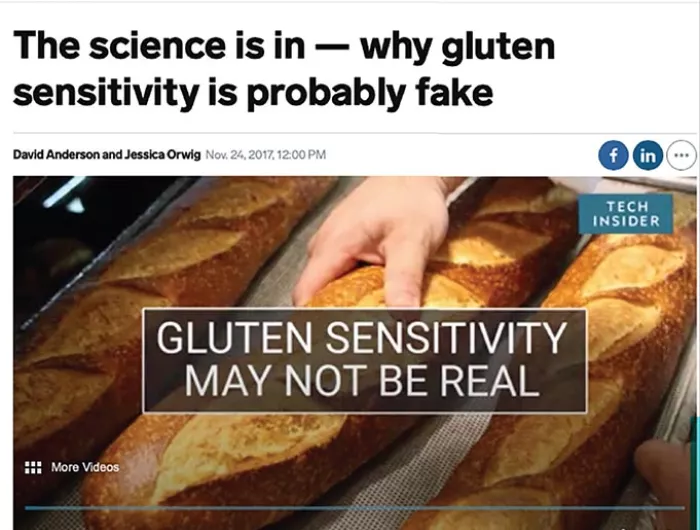What is gluten sensitivity?

“The science is in—why gluten sensitivity is probably fake,” ran the headline on businessinsider.com in 2017.
Gluten, a protein found in wheat, barley, and rye, can cause intestinal damage in people with celiac disease. (That’s why they need to avoid those grains.) Some people who don’t have celiac disease have been diagnosed with non-celiac gluten sensitivity because they report symptoms like nausea, vomiting, diarrhea, bloating, headache, fatigue, or joint pain when they eat gluten.
What exactly is gluten sensitivity?
“The honest answer, at this point, is that we don’t really know,” says Daniel Leffler, director of clinical research at the Celiac Center at Beth Israel Deaconess Medical Center in Boston.
There’s no lab test to diagnose gluten sensitivity. “But there is a group of patients who don’t have celiac, but have symptoms that are reproducibly improved when they avoid gluten and get worse when they’re exposed,” Leffler explains. “We just don’t know how large that group is.
It may be small.
In half a dozen studies that fed either gluten or a placebo to people with suspected gluten sensitivity, only about 15 percent had symptoms after eating gluten but not after eating the placebo.
So why do so many people think they’re sensitive to gluten?
“More than likely, it’s not one population,” says Leffler. That is, what doctors currently call “gluten sensitivity” is probably a melting pot of many conditions, only one of which is a true sensitivity to gluten.
“Wheat is a complex food made of many different proteins and molecules,” Leffler explains. “Some people may be reacting to something in wheat other than gluten.”
For example, cutting back on FODMAPs (fermentable oligosaccharides, disaccharides, monosaccharides, and polyols) curbs digestive complaints in some people. FODMAPs are poorly absorbed carbohydrates that are in a long list of foods including dairy, beans, wheat, prunes, asparagus, onions, and cauliflower
In the study that triggered the Business Insider headline, 59 Norwegian adults without celiac disease who were following a gluten-free diet ate a muesli bar made with either gluten or fructan (a FODMAP in wheat and other foods) or a placebo bar every day for one week each.
Overall, the volunteers reported worse gut symptoms during the week their bars had fructan rather than gluten or the placebo.
That doesn’t mean that “gluten sensitivity is probably fake,” as Business Insider claimed. But it’s worth considering a low-FODMAP diet if you have digestive complaints. “It can be a successful treatment for people with irritable bowel syndrome-like symptoms,” says Leffler.
“FODMAP sensitivity is probably more common than gluten sensitivity,” he adds. “I’ve had patients who respond better to a low-FODMAP diet and others who do better on a gluten-free diet. It just takes a bit of trial and error to figure out what works for each person.”
Some people might be what Leffler and others call “celiac lite.” “They are clearly sensitive to gluten and have the genetic markers for celiac disease, but their blood tests don’t meet the criteria for celiac disease.”
The microbiome is another possible explanation
“For some, it could be an issue with the microbiome,” says Leffler. “Different types of bacteria may influence how the gut reacts to wheat, which could explain some symptoms.”
If you think you’re sensitive to gluten, don’t change your diet until you get tested for celiac disease.
“That’s rule one, two, and three,” says Leffler.
Why? If you cut out gluten, a blood test might not pick up on the marker for celiac disease. If you’ve already stopped eating gluten, Leffler recommends talking to your doctor to create a plan to re-introduce it so that you can be tested.
“It’s important to get tested because unmanaged celiac is linked to other long-term health problems like osteoporosis and lymphoma,” he notes. “And celiac is hereditary, so getting tested can let family members know if they’re also at risk.”
The bottom line
“In the future, it’s likely that we won’t talk about gluten sensitivity as one disorder, but as many disorders that result in sensitivity to gluten or other components of wheat," says Leffler.

